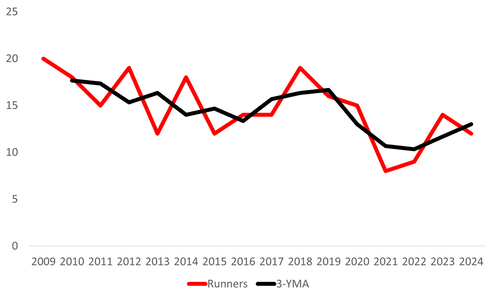Tomorrow marks the start of the 2024 Cheltenham Festival. For readers unfamilir with this annual sporting event, the 4-day festival is one of the most prestigious events in the world of horse racing. It takes place annually at Cheltenham Racecourse in south-west England.
The highlight of the Cheltenham Festival is the Cheltenham Gold Cup (run on Friday), a Grade 1 National Hunt race that is considered the pinnacle of steeplechasing. Other notable races during the festival include the Champion Hurdle (Tuesday), the Queen Mother Champion Chase (Wednesday), and the Stayers' Hurdle (Thursday).
The festival attracts top horses, jockeys, trainers, and spectators from around the globe. It is known for its lively atmosphere, high-quality racing, and the significant amount of betting that takes place during the event. This is particualry true of Irish racing fans with it sometimes joked that the Cheltenham Festival is the biggets racing event in Ireland.
In recent years the role and performance of Irish trained horse and owners has dramtically improved. It is not that long ago that Ireland would leave the Fesitval with a single-digit winner's total. In fact, in 1989 not a single Irish horse won at the then 3-day festival. Such an outcome would be unthinkable now and the growing competition between Ireland and Great Britain allowed for the creation of the Prestbury Cup in 2014.
The cup is awarded based on the total number of winners trained in Great Britain versus those trained in Ireland over the four days of the festival. The nation with the most winners at the end of the festival is declared the winner of the cup.
The problem with this now is that there is almost no competition. Ireland are 1/16 to have more winner that Great Britain. Irish domination may also be captured by the number of entries in each race. For example, on Day 1 of the festival in 2009 (15 years ago) 100 horses entered the 7 races. This year that number on Day 1 will be below 50.
The very first race - the Supreme Novice Hurdle - can demonstrate the trend. Below is data for the past 15 runnings (including entries for tomorrow).
Is this a general trend in horse racing? Smaller field sizes, even in the most coveted races? Possibly. The data from the BHA would suggest this is an issue.
Might it also be the case that an erosion of competitive balance is incentivising trainers to run horses in other races as they fear they cannot compete would some of the powerful, often Irish-based, trainers and horses? Or maybe skip the Festival entirely and instead target Aintree or Sandown, where the Irish presence is dramtically lower.

 RSS Feed
RSS Feed